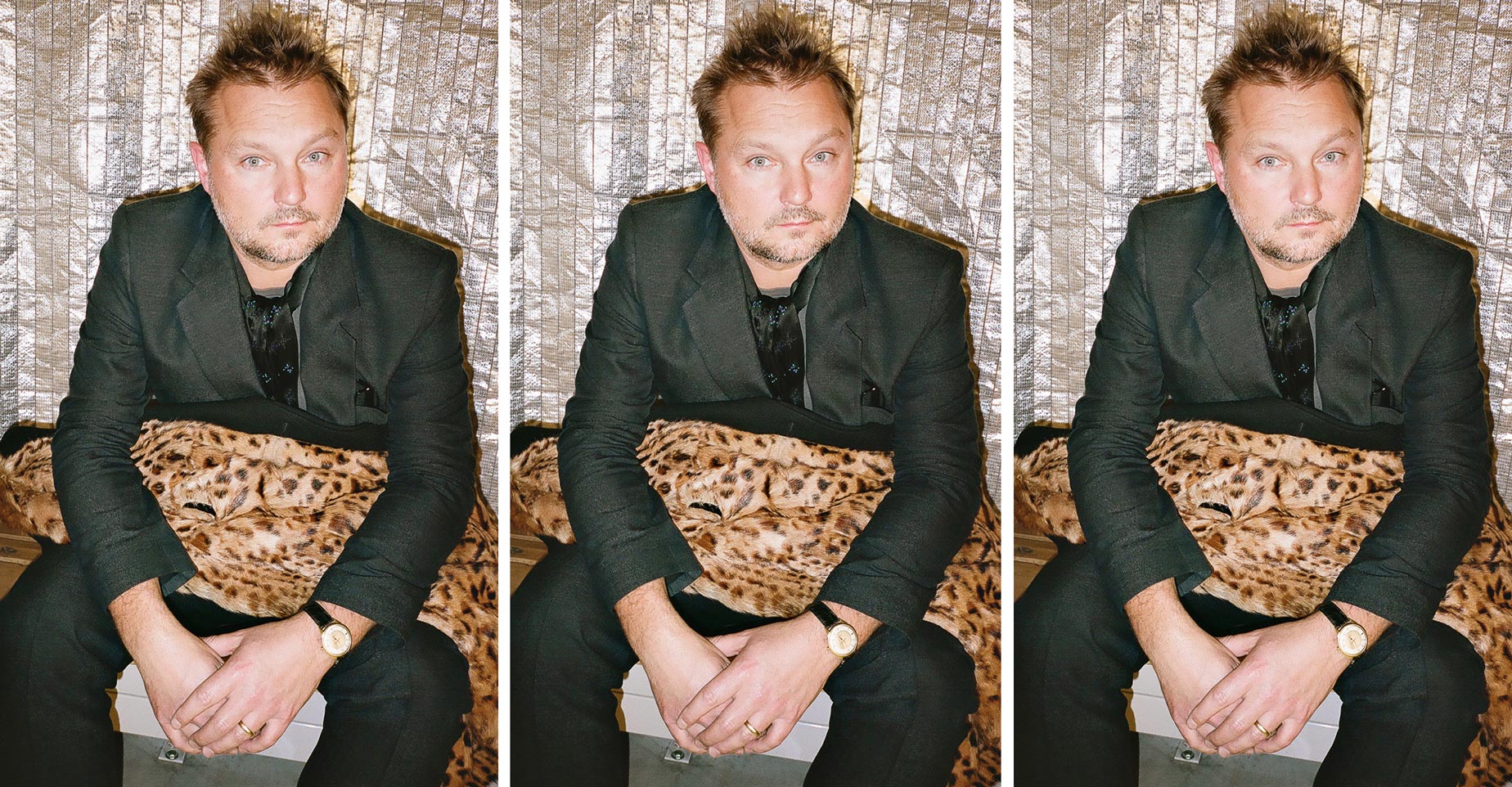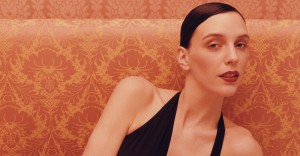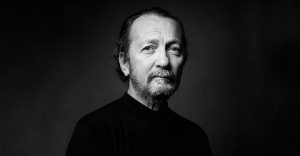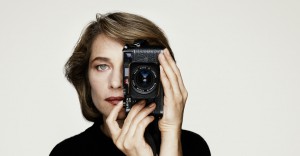Mr. Teller, your raw approach to fashion photography – often showing people, including yourself, unretouched or fully naked – has been praised, criticized, and widely imitated. How does your mother feel about the pictures you take?
She doesn’t like the photos where I am naked. She slowly accepts me as a person and accepts certain aspects of my work, but it took me a long time to get a handle on my mum. We’re slowly getting there, but she’s had a tough time. She’s like, “What are the neighbors going to say?” I just say that it fucking doesn’t matter! But she says, “You don’t understand, you are in London now! I get strange looks when I go to the butcher!” And she’s right. It’s different in a small town.
You’ve used your mother as a subject in some of your photos, too. Is it difficult to work with your family?
You have to spend an enormous amount of time. And also accept that you can’t push it. You go to the cemetery of our dad, you go for a walk, you go shopping with her, you do the wash. I can’t just fly home and say “All right! Stand here and let’s do this.” It’s the same for the kids. You can’t just order them around. You play with them and maybe you ask and they can say, “Well, I don’t want to do it.”
Family has no problem telling you what they really think.
Yeah! And my mum never took me seriously in a way. When I started to photograph her, after a few photos she would usually say, “Okay, you got it, right? You already took five photos that must be plenty.” But I cracked her. It’s exciting when you crack it! When you go on a journey together.
It seems like that’s what you’re trying to do with most of your work: go on a journey with the subject and document it.
Yeah, and if someone doesn’t want to work with me, I have no grudge. That’s completely fine. But when you have some people who actually call me and want to work with me, then it gets really exciting. And they kind of say they see themselves in my photographs, they always think that I do good portraits, they feel comfortable with it. In the end I think I make them kind of attractive, all these people I photograph.
I think so too, but your photos of celebrities do often make headlines because you show them how they actually look instead of a completely retouched version of themselves. Shouldn’t it be the other way around?
That’s right. I don’t understand it either. These horrific photographs are everywhere. Why isn’t anybody saying anything about that? It’s shocking. Of course I alter my photographs, whether I work analog or digital. You have a negative, and you can have an influence whether you want to have it more contrasty or less contrasty, you can pre-flash the photo paper. You can make it warmer or colder, lighter, darker. This is all a way of manipulating the image in a normal way, not changing the pixels.
On the other hand, do you sometimes shoot analogue because it would be too detailed if shot digitally?
To a certain extent. People always thought that I’ve got quite a hard aesthetic – and that was when I was working with analogue! Fucking hell, you see the hairs coming out of the pores with digital.
Shooting analogue also has the benefit that you can’t see the photos right away, doesn’t it? People just have to trust you more.
I never work with a screen. Other photographers have this black thing around and they go back and look at it. I’d rather spend the time with the subject, photographing or discussing or talking, than staring at this thing. I’d rather look at what’s going on. That probably also has to do because I have experience. After 30 years I can trust myself that what I’m doing is the right thing. Whereas young photographers look more.
You are one of the few fashion photographers able to blend commerce and art in a great way. What are other people doing wrong?
For some people it’s simply a job to make money. It might be exciting for them to do it, to travel to fabulous places or whatever. I just want to do everything as good as I possibly can. It is also good to fuck up, to act on an idea you have and just fail. You try to do something in this direction and it sort of triggers something else you had no idea about. And then you get something out of it. I think it’s really important to not be afraid of failure and to push yourself to try things and jump in the cold water. And there are incredible, beautiful opportunities within the framework of commercial restraint. They can give you money to produce something, to build something, to travel somewhere. There’s this wonderful chemistry where you can do something incredible.
Of course that only works if you choose the right people to work with in the first place.
Sure. I have a lot of requests, and that is a lot of work to filter through what you think you could achieve with a certain client. You have to say, “I can’t do it, I’m too busy,” or whatever because I think they’re asking me for the wrong reasons. You know? Or certain art directors… Most of the time when I work with someone it’s completely direct. I work with Vivienne Westwood directly, Marc Jacobs or Phoebe Philo from Celine. And I have a sense that they book me to take a risk, to go on an adventure. And that’s half the battle.
Do you ever have to make compromises? Recently you said no to shooting Miley Cyrus, so apparently you won’t shoot just anyone, not even for Marc Jacobs.
Well, this was a bit more of a complicated story. I never really raised my opinion about this subject. It came through the press from a statement that Marc Jacobs gave and the situation is more complex. It was always that we had a conversation and a discussion, and in that case suddenly there was no discussion anymore. And I don’t want to have, like, a gun put to my head… But in photography, you always have to make compromises, you know? To a certain extent. But that’s also a good thing.
You were a pioneer with your raw, flashed-out style of photography and many people imitated you afterwards. How did you deal with that?
Yes, at the beginning I thought that I kind of figured it out myself and then somebody comes along and tries to do that, too. Of course that’s annoying. But it didn’t bother me for very long because then you’re already somewhere else, you know? Like, I’m doing a cookbook or I was inspired or had this idea and I’m going there. It’s better to just think about what you want to do and not be bothered about what other people are doing. Because I work very instinctively with the subject I’m photographing, they can’t really copy me anyway. It’s me reacting to the subject, adapting to the situation, and nobody can think and feel exactly like I do.
Is that why you started taking photos of yourself? Nobody can really copy that either…
I think I got a slightly tired of photographing a lot of celebrities, whether it’s musicians, actors or models. You had to deal with a lot of vanity and I just didn’t want to ask anyone anymore. I thought, “Fuck it, I’m going to photograph myself. I’m not going to look very nice, but no one’s going to tell me what to do.” Also I wanted to feel how it is to be photographed by me!
Was that helpful?
It actually helped me a lot afterwards with my other work because I immediately sensed when a picture was right. The pose I have, where the cameras should be placed… You can go a lot further.
Was it also so that you know how far you can potentially push others?
No. That realization came afterwards. People saw the photos and were confronted with something quite raw. And that helped me, because then people also went further with themselves. But I didn’t do that consciously for that kind of thing.
Do you have to push people to a certain degree to get what you want?
No. No. No. It’s a kind of charm. It’s just the way you say it and how you say it. You can’t say it in the wrong moment and you can’t be afraid of anything. But I wouldn’t ask a person to do something that doesn’t make sense and I am hardly ever wrong with that. I wouldn’t ask a person to do, I don’t know, climb up that blue pipe or something. That would be stupid. It has to be appropriate…
What was appropriate about shooting pictures of yourself naked in bed with Charlotte Rampling?
I knew Charlotte for maybe 10 or 15 years before we shot that campaign, and I worked with her numerous times. So if I wouldn’t have known her and had approached her with the idea, she would have said, “Are you fucking crazy?” We did this portrait over the period of half a year, again and again. And my wife was there with me, helping me to execute the pictures.
And to make sure that everybody feels comfortable?
Yeah, I thought that really helps me to be… For Charlotte and for me to be on a lovely safe ground. We actually could go even further! You know what I mean? There’s someone else there that balances it out. And it’s a woman. And it’s my wife. So you have to think about all these kinds of scenarios.
What kind of reaction do you hope to get from people with pictures like that?
I mean, it would be awful if I do something and I really think is good and the person in the photograph rejects that portrait. That wouldn’t be very good. So it means a lot to me that the other person is in the game with me. It goes hand in hand. But I don’t think, “Oh my God, this is going to fucking rock the world and shake it,” I don’t think in those terms. I’m just thinking, “Is it good? Or is the work not good? How can it be better?” You know when the work is good.
Return to Top

Short Profile
Name: Juergen Teller
DOB: 28 January 1964
Place of Birth: Erlangen, Bavaria, Germany
Occupation: Photographer
Juergen Teller's latest book, Siegerflieger, is available now through Steidl Verlag.





















Comments
write a comment, read comments